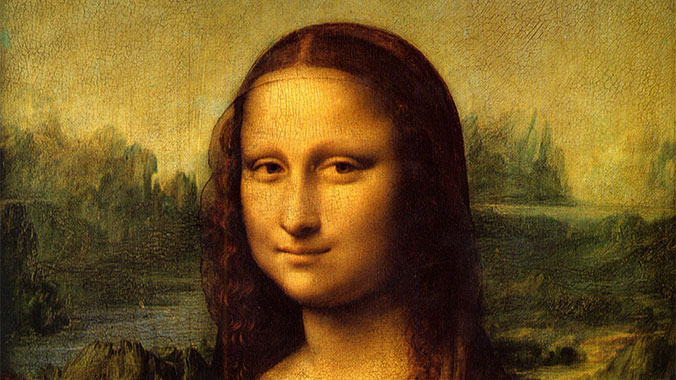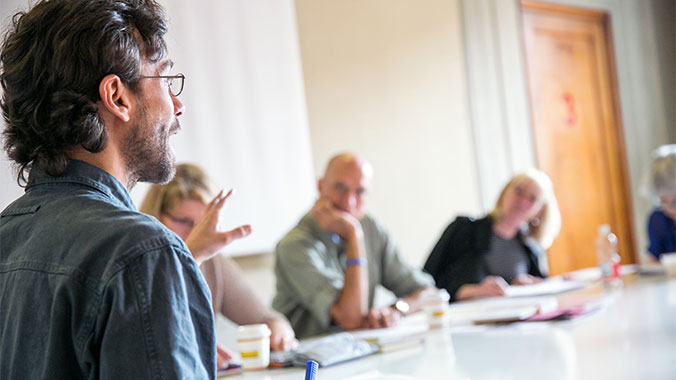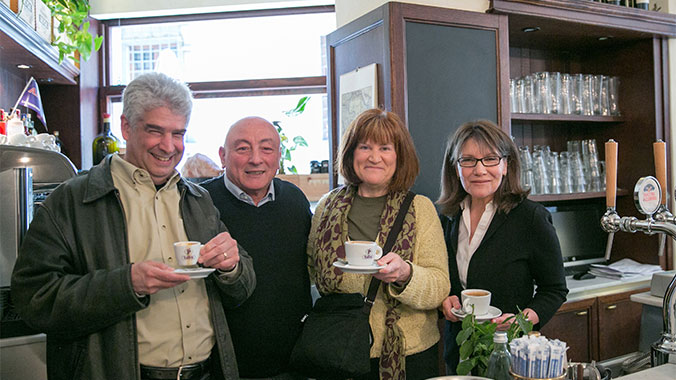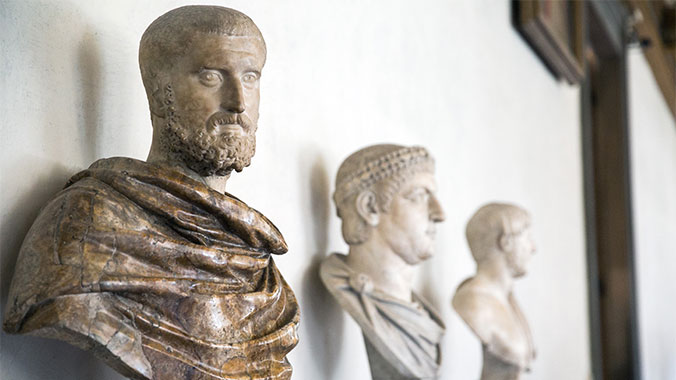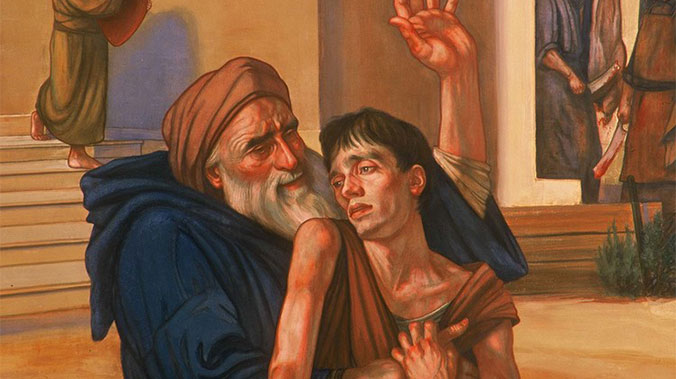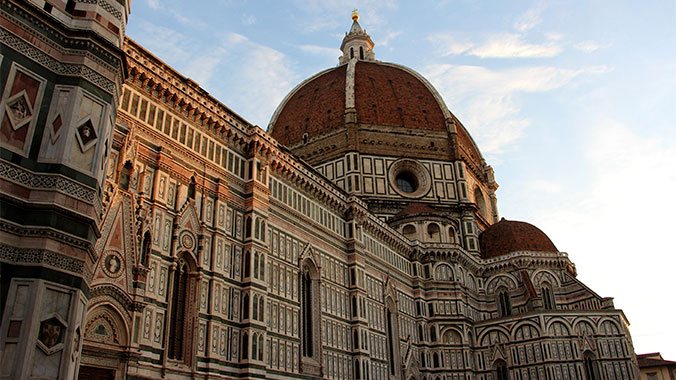North Carolina
The Beautiful and the Powerful of the Italian Renaissance
Program No. 22994RJ
The Medicis, Mona Lisa and St. Peter’s Basilica are Italian icons, but how did they come to be? Explore and discuss the origins, artists and legacy of the Italian Renaissance.
Itinerary
While we make every effort to ensure the accuracy of our published materials, programs are typically advertised more than a year prior to their start date.
Read More.
While we make every effort to ensure the accuracy of our published materials, programs are typically advertised more than a year prior to their start date. As a result, some program activities, schedules, accommodations, personnel, and other logistics occasionally change due to local conditions or circumstances. Should a major change occur, we will make every effort to alert you. For less significant changes, we will update you during orientation. Thank you for your understanding.
Duration
6 days
5 nights
What's Included
14 meals (
5B, 4L, 5D
)
13 expert-led lectures
1 performance
An experienced Group Leader
5 nights of accommodations
Taxes and customary gratuity
Road Scholar Assurance Plan
Day
1
Check-in, Registration, Welcome Dinner, Orientation
Location:
Montreat, NC
Meals:
D
Stay:
Assembly Inn
Activity Note
Check-in 3:00-5:30 p.m. Pull up to the porch of Assembly Inn to unload, then park your vehicle in any marked spot along the Lake or Assembly Drive.
Afternoon:
You will share the week at the Inn with other Road Scholar programs, so there might be an opportunity for friends to join you for the week, even if they are not interested in this program. Assembly Inn check-in 3:00-5:30 p.m. Pull up to the Assembly Inn porch to unload, then park your vehicle in any designated spot close to the Inn or by the lake and check in. Program Registration. After you check in and have your room assignment, join us at the Road Scholar table to register with the program staff and get your welcome packet containing the up-to-date schedule that reflects any changes, other important information, and to confirm the time and location of the Orientation session. If you arrive late, please ask for your packet when you check in. Feel free to relax in your room, meet and enjoy fellowship with other participants in the beautiful lobby, or stretch your legs with a walk around the campus before dinner.
Dinner:
In the Assembly Inn Dining Room 5:30-6:30 p.m., we’ll enjoy a buffet meal with a complete salad bar, choice of two entrées (or have both), good for you vegetables, bread and, of course, some yummy desserts; milk, coffee, sweet and unsweetened tea, water included. We do bus our own tables at each meal.
Evening:
Orientation: 7:00 p.m. The Group Leader will greet everyone and lead introductions. We will review the up-to-date program schedule, discuss roles and responsibilities, logistics, safety guidelines, emergency procedures, and answer questions. We will also meet the instructor. This is a Road Scholar Retreats program. Programming at Retreat locations includes opportunities for light morning exercise, interaction with members of the local community, a farm-to-table meal, and evening entertainment. Sleeping and dining facilities are in one building, with approximately 300 yards walking required. On some evenings, there will be entertainment such as a concert, dance, or storyteller followed by opportunities for fellowship in the lobby of the Inn. Periods in the schedule designated as “Free time” and “At leisure” offer opportunities to do what you like and make your experience even more meaningful and memorable according to your personal preferences. The Group Leader will be happy to offer suggestions. Program activities, schedules, personnel, and indicated distances or times may change due to local circumstances/conditions. In the event of changes, we will alert you as quickly as possible. Thank you for your understanding. We’ll finish up around 8:00 p.m. with some “get to know you” activities and then have refreshments and fellowship in the lobby. Continue getting to know your fellow Road Scholars, settle in, and get a good night’s rest for the day ahead.
Day
2
The Eternal City, Roma and the Settlement of Florentia
Location:
Montreat, NC
Meals:
B,L,D
Stay:
Assembly Inn
Activity Note
Classroom based program; walking according to personal preference. Join us in the main lobby each morning for "gentle stretches."
Breakfast:
In the Assembly Inn Dining Room, early morning coffee will be out around 6:30 a.m. Come to the lobby from 7;30 - 7:45 for some gentle stretches with Martha Nelson. The breakfast buffet is available from 7:30-8:30 a.m. with rotating daily choices such as biscuits and gravy, sausage, bacon, scrambled eggs, grits, hash browns, French toast, pancakes, oatmeal, cereal, granola, yogurt, fresh fruit, baked pastries, juices, coffee, tea, water.
Morning:
We’ll begin with an examination of the establishment of Rome as the center of the known world and the early Christians, and what will become known as Vatican City. We take a brief look at political and religious events, such as the establishment of Constantinople (330) the Sack of Rome (410), and the Eastern and Western Empires in Ravenna (402, 547) to set a stage for our discussions of the formal establishment of the Throne of St. Peter in Rome and the founding of the Vatican Museum and the early Sistine Chapel. After a mid-morning refreshment break, we’ll return to class to examine the Etruscans and the settlement of Florentia in the valley below Fiesole. We focus on the early Roman years with the establishment of the city now called Florence (Firenze in Italian). We look at the archeological research of formerly pagan first century Roman religious, secular and political structures to the 13th century medieval plan of Florence’s towers, palazzi and piazze, as we also focus on the importance and impact of the Arno River.
Lunch:
(Buffet) In the Assembly Inn Dining Room
Afternoon:
After lunch we focus on Dante and the importance of the mosaics of the baptistery of Florence, and the city’s patron saint, John the Baptist, along with a look at the century’s old tradition of Easter Sunday celebration in Florence and Calcio Storico. We will discuss the minting of the gold Florin coin, and the establishment and importance of the Guilds in Late Medieval Florence. Orsanmichele and the building of the guild-supported churches such as Santa Maria Novella and Santa Croce and their sculpture and frescoes as religious, social and political statements will be considered. Before ending class, we learn about frescoes: how they are created and restored. The remainder of the afternoon is free. You might like to participate in the Walk Around Montreat that includes a visit to the Chapel of the Prodigal and viewing the “Prodigal Son” fresco by Ben Long.
Dinner:
Dining Room buffet.
Evening:
Our evening program will feature a local musician/band or a storyteller. The remainder of the evening is at leisure, with activities in the lobby of the Inn for fellowship.
Day
3
Rise of the Renaissance and Humanism, the 15th century
Location:
Montreat, NC
Meals:
B,L,D
Stay:
Assembly Inn
Activity Note
Classroom based program. Walking according to personal preference. Join us in the lobby each morning for "gentle stretches."
Breakfast:
(buffet) In the Assembly Inn Dining Room, early morning coffee will be out around 6:30 a.m. Come to the lobby from 7;30 - 7:45 for some gentle stretches with Martha Nelson.
Morning:
Our discussions of yesterday continues as we introduce the major names of the Late Christian and Byzantine and Early Renaissance in Florence and Siena, like Giotto, Cimabue, Simone Martini, Lorenzo Monaco, and Gentile di Fabriano. Colors, symbols, and other ways as a means of explaining the Platonic Academy and Marsilio Ficino and Pico dell Mirandola will be noted. Religious and civic art and architecture with works of art by Fra Lippo Lippi and Sandro Botticelli, Domenico Ghirlandaio, will demonstrate the impact on the movement to humanism and the rebirth of the classic style in Renaissance Italian art. Present-day coding, fashion and technology will be related to Renaissance ideology and themes as we will look at the Brancacci Chapel, the Sistine Chapel of Tuscany, and the roles that Masaccio and Masolino played in the incremental advances in how artists portrayed “us” as human beings”.
Lunch:
(Buffet) in the Dining Room
Afternoon:
This afternoon we look at “Feud that Sparked the Renaissance” – the Baptistery doors of Florence, Ghiberti and Brunelleschi -- and the building of the cupola of Florence by the first modern architecture. And conclude the day with the Renaissance maximum: “Man is the measure of all things” visualized in statues by Donatello including two versions of David, and then special focus on Michelangelo’s early sculptures including his David as a political and civic theme of the city of Florence and Machiavellian ideas. We will also look at the relationship of Michelangelo and the enigmatic Leonardo da Vinci and why da Vini’s drawing known as the Vitruvian Man is the perfect symbol of the Renaissance. The remainder of the afternoon is free.
Dinner:
(Buffet) In the Dining Room.
Evening:
We’ll gather for another fun evening program such as a concert, storyteller, or a dance followed by games, cards, or TV in the lobby.
Day
4
High Renaissance/Mannerism in Florence, demise of de' Medici
Location:
Montreat, NC
Meals:
B,L,D
Stay:
Assembly Inn
Activity Note
Classroom based program. Walking according to personal preference. Join us in the lobby each morning for "gentle stretches."
Breakfast:
(Buffet) In the Assembly Inn Dining Room, early morning coffee will be out around 6:30 a.m. Come to the lobby from 7;30 - 7:45 for some gentle stretches with Martha Nelson.
Morning:
The morning is devoted to the patrons of the Renaissance – the Medici Dynasty --- from the first Giovanni di Bicci de' Medici, later under his son Cosimo di Giovanni de' Medici (the Elder) and great-grandson, Lorenzo de' Medici (known as il Magnifico) and the assassination attempt on the lives of Lorenzo and his brother Giuliano. A further discussion focuses on the Dominican friar Girolamo Savonarola and the “fall” of the de’ Medici from Florence, and the establishment of Florence as a Repubblica and the ‘change’ in artists such as Botticelli. After the morning break, then, we look at the religious crisis of Michelangelo and the effect of the Catholic Church and papal patronage, along with his belief in Protestant ideals and reform as ‘hidden’ in the iconography of the tomb of Pope Julius II. We will discuss his series of Pieta’s sculpted, especially that meant for his tomb. We turn to the rise of two de’ Medici popes significantly affecting the coffers of the Church. Their power in France with two queens and conflicts in Spain and England are topics to be emphasized. Then, we look at artists Rosso Fiorentino, Pontormo and others who developed a new style in art called Mannerism, and how this change is seen in the public and religious ideals in the ‘return’ of the Medici to Florence with the Duke of Tuscany Cosimo de’ Medici and his wife Eleanor of Toledo, the first, First Lady. The importance of the building of the Uffizi is discussed, culminating in the last of the de’ Medici family members Anna Maria Luisa and the establishment of State Museums.
Lunch:
(Buffet) In the Dining Room.
Afternoon:
Free time. This period of time has been set aside for your personal independent exploration to see and do what interests you most. Please refer to the list of Free Time Opportunities. The Group Leader will be happy to offer suggestions. Please note that the period scheduled for free time is subject to change depending on local circumstances and opportunities for independent exploration.
Dinner:
Our farm to table (buffet) meal.
Evening:
We hope you enjoyed your free afternoon, now back to class time! This evening’s lecture looks at various still life paintings and portraits by Caravaggio and Veronese and many others to show the traditions of food, drink, and the influences of various cultures and customs in the kitchen and at the table in Medieval and Renaissance art. The Etruscans were eating the beefsteak and Chianti wine that the de ’Medici enjoyed in their day. Brunelleschi developed a special hearty stew for his workers but why without tomatoes? We look table manner and settings in Catholic households along with trade and contracts with the Papacy as also seen in Venetian art, and the influences of other seafaring countries such as Norway. Other discussions focus on Leonardo da Vinci who when he wrote in his Codex Atlanticus about folding geometric shapes – was he referring to using napkins or designs for his airplanes? When da Vinci suggested quail eggs for the Sforza family of Milan’s banquet was he the first celebrity chef, yet no corn was on the menu? Wealthy women are shown in portraits with golden toothpicks, and picking one’s teeth at the table was the height of elegance at Renaissance Venetian banquets. The frescoes of city life in Siena by the Brothers Lorenzetti’s’ in the Commune of Siena are perfect examples of daily life, showing the quintessential local pig. This evening’s lecture includes why phrases such as “worth your weight in salt” were used beyond the kitchen.
Day
5
Surprise of the Italian Renaissance, Venice
Location:
Montreat, NC
Meals:
B,L,D
Stay:
Assembly Inn
Activity Note
Classroom based program. Walking according to personal preference. Join us in the lobby each morning for "gentle stretches."
Breakfast:
(Buffet) in the Assembly Inn Dining Room, early morning coffee will be out around 6:30 a.m. Come to the lobby from 7;30 - 7:45 for some gentle stretches with Martha Nelson.
Morning:
This morning we will discuss Leonardo da Vinci's 'unusual' works and the ‘unfinished’ Mona Lisa, her mysterious smile, and why she is in France not Italy. The Last Supper scene in Milan will be critiqued and looked at as a piece of music, while we debate the authenticity of Salvator Mundi. Leonardo’s association with Venice and a look at his many drawings and inventions for this floating city leads us to introduce the city of light and shadow, of music, politics and water: Venice (Venezia in Italian). After our morning break, we’ll learn about Venice's early years, from Torcello to Burano and Murano, with the reasons for its establishment and some comments (and a video) on its precarious state and fragile ecosystem, and the “marriage” the Venetians have to the Sea.
Lunch:
Dining Room buffet.
Afternoon:
After lunch, we continue with Venezia, known as La Serenissima (The Most Serene Republic of Venice): We’ll trace the early years of the basilica of San Marco as a place of worship and veneration, and the subsequent establishment of St. Mark as the patron saint of the city. The influences of the East and the Crusades will be seen in the mosaics of the façade of the Basilica of San Marco, and the art works of Bellini, Giorgione and others. We will emphasize how Venice looked East for is inspiration in architecture and fashion and is seen in a specific Venetian style of textiles.
Dinner:
(Buffet) in the Dining Room. Share some of your favorite experiences with new Road Scholar friends during our farewell dinner.
Evening:
Our evening program features Bobbie Pell, the Moonstone Ministrel. She'll delight us with stories and songs. Fellowship in the lobby follows. Prepare for check-out and departure.
Day
6
Venice, Program Concludes
Location:
Montreat, NC
Meals:
B
Activity Note
Check-out by 11:00 a.m.
Breakfast:
In the Dining Room.
Morning:
This morning, we continue with the city of Venice's meteoric rise in commerce and trade and as a maritime center with explorers such as Marco Polo, and the political and religious power of the Doges. The influences of being a “floating city” on its various historic and present-day residents, and the importance of the Scuola or lay confraternity. The influence of the plague and Inquisitions on the Venetians will also be examined through the paintings of Titian, Tintoretto and Veronese. We conclude by looking at Venetian bead work in the Americas and Africa. Our class ends at 10:15 am, giving you time to check out of your room by 11 am.
Afternoon:
If you are returning home, safe travels. If you are staying on independently, have a wonderful time. If you are transferring to another Road Scholar program, detailed instructions are included in your Information Packet for that program. We hope you enjoy Road Scholar learning adventures and look forward to having you on rewarding programs in the future. Don’t forget to join our Facebook page and follow us on Instagram. Best wishes for all your journeys!
Please select a day to update the map
Map details are not available for this location.

